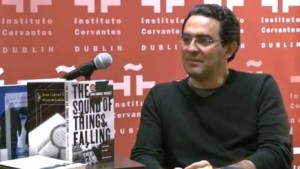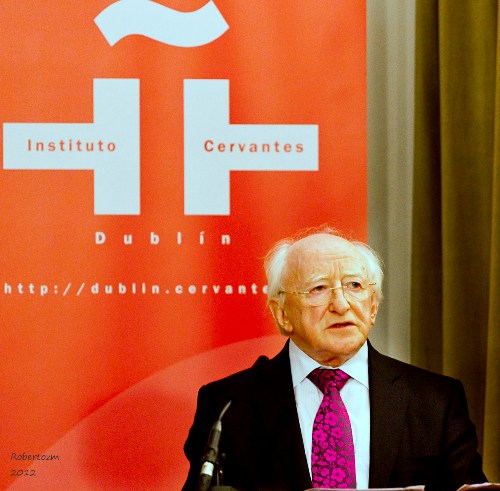Blog del Instituto Cervantes de Dublín
Torre Martello
Autor del mes | Author of the Month: Rafael Gumucio
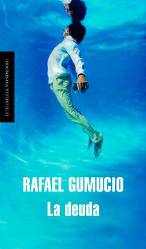
Nuestro autor del mes de febrero es el chileno Rafael Gumucio (Santiago, 15 de enero de 1970) que recientemente nos visitó durante el Festival ISLA.
Es hijo del historiador Rafael Luis Gumucio y nieto del político de izquierda Rafael Agustín Gumucio. Cursó sus estudios en Literatura en la Universidad de Chile y tras el golpe militar de 1973 se vio obligado a exiliarse en Francia donde residió varios años antes de poder regresar a Chile. Posteriormente también vivió en España donde permaneció hasta el 2004.
En 1999 publicó Memorias prematuras un libro donde el escritor narra su vida; el exilio con su familia en Francia, su regreso a Chile, su fracaso con las mujeres, sus inicios en el periodismo y la vida universitaria. Para muchos es lo mejor de su producción.
Es autor entre otras obras de Monstruos cardinales (2002), Comedia nupcial (2002), Páginas coloniales (2006) etc. Destacan especialmente Los platos rotos (2004), un ensayo histórico que une cuento, teatro, novela y narrativa y repasa la historia de Chile y también La deuda (2009), novela inspirada en el caso del contador de las estrellas, un estafador que engañó a artistas y animadores.
Ha escrito para publicaciones tan prestigiosas como La Nación, El Mercurio, La Tercera, El Metropolitano, Las Últimas Noticias, El País, ABC y el New York Times, así como en las revistas Apsi, Rock & Pop, Fibra, de la que fue creador y editor general, The Clinic, de la que también fue uno de sus fundadores.
Ha sido también animador, guionista y realizador de programas de televisión como Gato por liebre (Rock & Pop Televisión, 1995-1998) y del programa de humor absurdo Plan Z, que recibió múltiples censuras.
Es director del Instituto de Estudios Humorístico de la Universidad Diego Portales y humorista-locutor del programa Desde Zero de Radio Zero, junto a Patricio Fernández y Claudia Álamo. En 2004 resultó ganador del Premio Anna Seghers y fue finalista del Premio Altazor en los años 2000 y 2003 con Memorias prematuras y Monstruos cardinales.
Te esperamos en la biblioteca con lo más destacado de la obra de Rafael Gumucio.
The author of the month of February is Chilean writer Rafael Gumucio (Santiago, 15th January 1970) who recently visited us during the ISLA Festival.
He is son of the historian Rafael Luis Gumucio Rivas and grandson of the left-wing politician Rafael Agustín Gumucio. He studied Literature at the University of Chile. After the 1973 Chilean coup d´etat he lived as an exile in France before returning to Chile. He also resided in Spain for several years until 2004.
He published his first novel in 1999, Memorias prematuras (Premature memoirs) a book where the writer narrates his life; the exile with his family in France, his return to Chile, his failure with women, his first dabblings in journalism and university life. This book is considered his best work to date.
He has written among others: Monstruos cardinales (2002), Comedia nupcial (2002), Páginas coloniales (2006) etc. The most relevants are Los platos rotos (2004), an historical essay that has something of short story, theatre, novel and narrative telling the history of Chile and also La deuda (2009) a novel inspired in the case of the “star meter”, a con man who tricked artists and entertainers.
He has written for the newspapers La Nación, El Mercurio, La Tercera, El Metropolitano, Las Últimas Noticias, El País, ABC and New York Times and for the magazines Apsi, Rock & Pop, Fibra, of which he was founder and general editor and The Clinic, of which he was also one of its founders.
He has also been conductor, script-writer and producer of television shows like Gato por liebre (Rock & Pop Televisión, 1995-1998) and of the absurdist humour show Plan Z (TV show), which was censored more than once.
He is director of the Instituto de Estudios Humorísticos of the Universidad Diego Portales and comedian-host of the Desde Zero show on Radio Zero with Patricio Fernández and Claudia Álamo. He won the Anna Seghers Award in 2004 and he was short-listed for the Altazor Award in 2000 and 2003 with Memorias prematuras and Monstruos cardinales.
We hope to see you at the library with a selection of Rafael Gumucio´s work.
Audiolibro de la semana | Audiobook of the Week: Cuando fumar era un placer
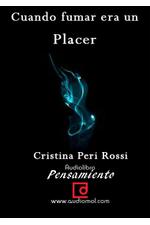 El original audiolibro que te recomendamos esta semana es Cuando fumar era un placer de la excelente escritora y ex fumadora empedernida Cristina Peri Rossi. Para descargar este audiolibro solo tienes que seguir dos pasos: hacer click aquí y meter tus datos de usuario de la biblioteca.
El original audiolibro que te recomendamos esta semana es Cuando fumar era un placer de la excelente escritora y ex fumadora empedernida Cristina Peri Rossi. Para descargar este audiolibro solo tienes que seguir dos pasos: hacer click aquí y meter tus datos de usuario de la biblioteca.
Hoy por hoy, cuando el fumar ya no es un vicio sino casi un pecado, la autora da un repaso a lo que fue su vida en compañía de la cajetilla de cigarrillos. Desde sus días de infancia en Montevideo, cuando decidió que su destino sería convertirse en una mujer tan libre y hermosa como las señoras que tomaban café y fumaban en los bares céntricos de la ciudad, hasta el diario que describe sus primeros meses de abstinencia, cuando ni escribir, ni amar, ni leer, ni charlar con los amigos tenía sentido sin el aroma de un pitillo, toda una historia de amor y odio se desgrana por las páginas de este libro insólito y muy íntimo.
Es un homenaje a un vicio que fue amor, dice la autora, a una relación más larga que un matrimonio, compañero que nos mata lentamente.
The original audiobook that we recommend you this week is Cuando fumar era un placer by the excelent writer and ex heavy smoker Cristina Peri Rossi. To download this audiobook you only have to follow two steps: make click here and enter your library card number and password.
At the present time smoking is considered not only a vice but almost a sin. The author reviews her life as a former smoker. From her childhood days in Montevideo, when she decided that her destiny was becoming a free and beautiful woman, just like the ladies who used to drink coffee and smoke in the bars in the city center to the diary where she describes her first months without smoking. Writing, loving, reading or talking to friends had no sense without the smell of a cigarette. A love-hate story is told through the pages of this unusual and personal book.
It ´s a tribute to a vice that according to the author was love, a longest relationship than marriage, a partner that kills us slowly.
Audiolibro de la semana | Audiobook of the Week: Las otras vidas
El primer audiolibro que te recomendamos este año es Las otras vidas de la autora argentina Clara Obligado. Para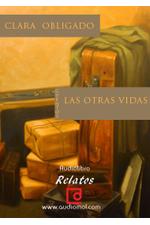 descargar el libro solo necesitas tu carnet de la biblioteca, hacer click aquí y ¡voilà!
descargar el libro solo necesitas tu carnet de la biblioteca, hacer click aquí y ¡voilà!
Clara Obligado nos ofrece cuentos de desarraigos, exilios, partidas y retornos, de encuentros y desencuentros. Cuentos desgarrados, intensos, sin embargo vitales y esperanzadores, alternan la tragedia y la comedia, lo real y lo irreal, la otredad con que todos convivimos, nuestras “otra vidas”.
Escritos, como dice la autora, “desde ningún lugar y desde varios a la vez”, estos relatos nos interrogan sobre el destino, sobre qué hubiera sucedido si, en lugar de un camino, hubiésemos tomado otro.
The first audiobook that we recommend you this year is Las otras vidas by Argentinian writer Clara Obligado. To download this book you only need your library card, make click here and voilà!
Clara Obligado brings a collection of tales about uprooting, exile, departures and returns. These are heart-breaking and intense stories, full of life and hope where tragedy and comedy, real and unreal things mingle with the otherness, with our “other lives”.
As the author says: “These tales are written from nowhere and from several places at the same time”. These stories question us about destiny, about what it could have happened if we had taken one way instead of the other.
Audiolibro de la semana | Audiobook of the Week: El huésped
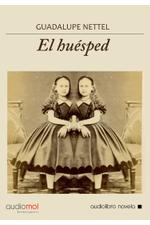 El audiolibro de la semana es una de las propuestas más interesantes de la literatura mexicana reciente: El huésped de Guadalupe Nettel. Para descargarte esta historia fascinante necesitas la tarjeta de la biblioteca y hacer click aquí.
El audiolibro de la semana es una de las propuestas más interesantes de la literatura mexicana reciente: El huésped de Guadalupe Nettel. Para descargarte esta historia fascinante necesitas la tarjeta de la biblioteca y hacer click aquí.
La extraña historia de una niña habitada interiormente por un ser inquietante, quizás imaginario, quizás no. Ana sostiene una lucha silenciosa contra esa hermana siamesa, hasta que el huésped comienza a manifestarse en su entorno familiar de una manera devastadora.
Alrededor de esa presencia se fraguan los acontecimientos de una vida, entre ellos las tragedias familiares, su existencia como adulta. Los personajes, incluida la ciudad, se desdoblan en una confusión de reflejos, se mueven entre lo superficial y lo profundo, sin que sepamos nunca el territorio que pisamos. También describe la cara subterránea de la ciudad de México.
Son personas que no encuentran un lugar en el mundo y se organizan en grupos paralelos que imponen sus propios valores y que comprenden su rara belleza. La autora explora estos universos guiada por una intuición: en los aspectos que nos negamos a ver del mundo -o de nosotros mismos- se esconden las pautas que nos ayudan a sobrellevar la existencia.
The audiobook of the week is one of the most interesting novels of recent Mexican narrative: El huésped by Guadalupe Nettel. If you wish to download this fascinating story you need your library card and make click here.
This is the strange story of a girl who has a disturbing living being inside her, maybe imaginary, maybe not. Ana has a silent fight with her “Siamese sister” until it starts to act in her home environment in a devastating way.
Life, family tragedies and her existence as an adult evolve around this living being. The characters, including the city, are divided in a confusion of reflections and move between the superficial and the profound. We never know the territory where we are stepping. It is also described the subterranean side of Mexico DF.
These are people who are not able to find a place in the world and they organize each other in parallel groups who understand their rare beauty and have their own values. The author explores these universes guided for an intuition: the clues that help us to bear our existence lie in the aspects of the world or of ourselves that we don´t want to see.
[Video] Entrevista a Juan Gabriel Vásquez / Interview with Juan Gabriel Vásquez
Juan Gabriel Vásquez es uno de los mejores novelistas de su generación, y El ruido de las cosas al caer, que aborda el devenir de Colombia durante la época de Pablo Escobar, es una de sus grandes novelas.
El pasado mes de noviembre, tuvimos la suerte de recibir a Juan Gabriel Vásquez en el Instituto Cervantes de Dublin, donde presentaró y leyó algunos fragmentos de su libro. El autor colombiano fue entrevistado por la periodista de RTE Paula Shields y a continuación mantuvo un animado debate con el público.
En este video, nuestro compañero Sergio Angulo charla con él acerca de El Ruido de las cosas al caer, Premio Alfaguara de Novela 2011, que ahora ha sido traducida al inglés.
Juan Gabriel Vásquez (Bogotá, Colombia, 1973) estudió derecho en su ciudad natal y más tarde se doctoró en Literatura Latinoamericana en La Sorbona. Actualmente reside en Barcelona. Es autor de tres novelas “oficiales” —Los informantes, Historia secreta de Costaguana y El ruido de las cosas al caer—, aunque escribió otras cuando tenía 23 y 25 años de edad, que él prefiere eliminar. Sus novelas han sido traducidas en Inglaterra, Francia, Holanda, Italia y Polonia.
Juan Gabriel Vasquez is one of the leading novelists of his generation, and The Sound of Things Falling that tackles what became of Colombia in the time of Pablo Escobar is his best book to date.
We are so lucky to have him at the Instituto Cervantes Dublin, where he introduced and read an extract of his book and he was interviewed by RTE journalist Paula Shields.
Juan Gabriel Vásquez (Bogotá, Colombia, 1973) studied law in his hometown and obtained a phd in Latin American Literature in the Sorbone University. At present he lives in Barcelona. He has published three “official” novels – The informers, The secret history of Costaguana and The Sound of Things Falling— however he wrote others at the age of 23 and 25 which he prefers to omit. His works have been translated in England, France, Netherlands, Italy and Poland.
La biblioteca propone: 50 años del “Boom” / The library suggests: 50 years of the Latin American Boom
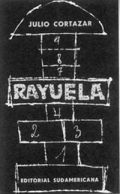 La biblioteca celebra en los meses de diciembre y enero el 50 aniversario del boom latinoamericano. El boom latinoamericano no es un movimiento, ni una escuela, sino un fenómeno editorial y literario en el que un grupo de jóvenes talentos fueron capaces de crear obras originales, atrayentes y rompedoras, exportando por primera vez la literatura latinoamericana fuera de sus fronteras.
La biblioteca celebra en los meses de diciembre y enero el 50 aniversario del boom latinoamericano. El boom latinoamericano no es un movimiento, ni una escuela, sino un fenómeno editorial y literario en el que un grupo de jóvenes talentos fueron capaces de crear obras originales, atrayentes y rompedoras, exportando por primera vez la literatura latinoamericana fuera de sus fronteras.
Surgió en la década de los sesenta y revolucionó la literatura latinoamericana teniendo un impacto y una influencia a nivel mundial que todavía perdura.
As it had to be, our topic for December and January is the 50th anniversary of the Latin American Boom. It is not a movement or a school; it can be seen as a literary and publishing phenomenon in which a group of young talents were able to create original, appealing and groundbreaking works, spreading Latin American literature outside its frontiers for the first time.
It started in the 60s and it revolutionized Latin American literature causing great impact and influencing worldwide literature. Currently this influence is still present.
Entrevista con Juan Gabriel Vásquez
Juan Gabriel Vásquez: Escribe solo si sientes que no serás feliz de otra manera
Entrevista con Juan Gabriel Vásquez realizada el 14 de noviembre de 2012 en la Biblioteca Dámaso Alonso del Instituto Cervantes de Dublín con motivo de la presentación de la traducción al inglés de su libro El ruido de las cosas al caer.
Juan Gabriel Vásquez (Bogotá, 1973) es autor de la colección de relatos Los amantes de Todos los Santos y de las novelas Los informantes e Historia secreta de Costaguana. También ha publicado una recopilación de ensayos literarios, El arte de la distorsión (que incluye el ensayo ganador del Premio Simón Bolívar en 2007), y una breve biografía de Joseph Conrad, El hombre de ninguna parte. Ha traducido obras de John Hersey, John Dos Passos, Victor Hugo y E. M. Forster, entre otros, y es columnista del periódico colombiano El Espectador. Sus libros se han publicado en catorce lenguas y una treintena de países. Su tercera novela, El ruido de las cosas al caer, ganó el Premio Alfaguara en 2011.
Sergio Angulo: —Juan Gabriel, El ruido de las cosas al caer es tu última novela ¿nos puedes contar algo sobre ella?
Juan Gabriel Vásquez: —La novela trata sobre un profesor joven de derecho llamado Antonio Yammara que un día conoce a un personaje misterioso, un tipo llamado Ricardo Laverde, que evidentemente tiene algo que ocultar, que evidentemente no es quien dice ser. Y lo que comienza siendo una curiosidad frívola se convierte en algo más serio cuando asesinan a Ricardo Laverde a tiros en la calle, mediante un asesino a sueldo. El narrador del libro es alcanzado por una bala, un balazo directo que, evidentemente, cambia su vida, y se obsesiona con la idea de que averiguar quién era este tipo y por qué fue asesinado le permitirá obtener alguna verdad sobre lo que le ha pasado a él, sobre la manera en la que su vida ha cambiado. Así que se embarca en una investigación personal sobre la vida de un hombre muerto y sobre el pasado de Colombia, y eso lo devuelve a los años en los que el mercado de la droga comenzó en Colombia, a principios de los setenta.
Averiguamos que este hombre era piloto, y que no fue solo testigo, sino que también tomó parte en los primeros momentos del mercado de la droga. Y así, la novela se convierte en una especie de exploración de lo que ha significado para mi generación crecer al mismo tiempo que el mercado de la droga y, particularmente, lo que significó para nosotros sufrir los peores años de la violencia relacionada con la guerra de la droga de los ochenta, cuando Pablo Escobar, básicamente, declaró la guerra al gobierno colombiano. Eso es lo que he intentado explorar.
Sergio Angulo: —La historia no está basada en hechos reales, pero de alguna manera refleja la realidad de una era en Colombia.
Juan Gabriel Vásquez: —Es un trabajo de la imaginación, y he intentado explorar cosas que realmente pasaron. Una de mis obsesiones, evidentemente, ha sido, no solamente en esta novela, sino en otras novelas también, cómo los hechos públicos moldean nuestras vidas privadas. Esta es una de las cosas que me interesan como novelista. Cómo esas cosas que pasaron en lo que llamamos «historia» o «política» penetran en nuestras vidas y afectan el modo en que nos comportamos como amigos o parejas, padres o hijos. Eso es lo que mi novela intenta hacer.
Una de las razones para escribir una novela es la reflexión sobre aquellos años, sobre aquel período de nuestras vidas. Teníamos mucha información pública, un montón de estadísticas, un montón de imágenes en los medios de comunicación. Podemos incluso encontrar el vídeo de un candidato a presidente de Colombia siendo asesinado. Pero en algún momento, me sentí angustiado ante la idea de que no había ningún lugar donde pudiéramos ir para averiguar sobre los efectos íntimos y privados que todo eso tuvo. Así que en cierto sentido, el novelista que quería ser es una especie de historiador de emociones. Intenta averiguar cuál es el lado moral y emocional de esos hechos que son públicos.
Sergio Angulo: —Estuviste viviendo en Francia durante un tiempo y, por lo que sé, ahora estás establecido en España, en Barcelona. ¿Ha tenido la distancia algún efecto en tu manera de ver Colombia?
Juan Gabriel Vásquez: —Es muy difícil probar eso, pero siempre he dicho que si pude escribir sobre Colombia es porque dejé Colombia. Mi primer libro es un libro de historias sobre Bélgica y Francia, y la gente me preguntaba por qué no escribía sobre Colombia y la gente de allí. Y la razón, para ponerlo en pocas palabras, es que como sentía que no lo entendía, que no entendía realmente a mi país, no tenía derecho a escribir sobre él. Y creo que por la distancia, por el tiempo que pasé fuera, y porque había un océano entre mi país y yo, terminé dándome cuenta de que quizás el hecho de que no entendiera mi país era el mejor motivo para escribir sobre él, que podría usar la novela como una manera de comprender mejor la historia de mi país y cómo me ha modelado como individuo.
Sergio Angulo: —Barcelona es históricamente una ciudad donde muchos de los autores latinoamericanos más importantes han vivido. Y ahora que estamos celebrando el cincuenta aniversario del boom latinoamericano, ¿qué queda de ese boom literario?, ¿se está expandiendo todavía, o hay un punto de inflexión con las nuevas generaciones, ya que estáis llevando caminos distintos?
Juan Gabriel Vásquez: —Siempre he considerado a los escritores del boom Latinoamericano como los fundadores de mi tradición. La tradición en la que yo intentaba escribir empezó con ellos. Antes que ellos, la novela latinoamericana había producido un par de trabajos aislados. Trabajos muy interesantes, pero aislados. No había una tradición de novelas latinoamericanas en las que basarse. Eso comenzó con ellos, con Vargas Llosa, García Márquez, Carlos Fuentes, Julio Cortázar. Ellos siguen estando muy presentes para mí, en el sentido de que todavía viven. Vargas Llosa y García Márquez todavía viven. Vargas Llosa todavía escribe. Pero al mismo tiempo son clásicos. Son clásicos en vida. Y para mí, como he dicho antes, compartir el mismo mundo con ellos es casi como si un escritor irlandés del siglo XXI pudiera coger el teléfono y llamar a James Joyce, porque estos tipos son los fundadores de mi tradición. Así que es una situación muy rara y muy rentable. No me siento en modo alguno amenazado por su presencia, como les pasa a otros escritores. Creo que hay un gran legado que ha abierto muchas puertas a los que hemos venido después de ellos.
Sergio Angulo: Viviendo en Europa. ¿Crees que nuestra percepción de Latinoamérica es adecuada desde aquí?
Juan Gabriel Vásquez: —Siempre hay cierto grado de inexactitud, pero funciona en los dos sentidos. Los medios de comunicación tienen una habilidad extraordinaria para distorsionar la imagen de un país, a veces simplemente porque tienen recursos limitados, tiempo limitado… Pero una de las cosas buenas de las novelas es que, de algún modo, luchan contra el cliché, el estereotipo, de modo que los lectores podemos obtener una mejor comprensión de la complejidad de los Estados Unidos cuando leemos a Philip Roth. Quizás un lector irlandés, o británico, pueda comprender mejor la complejidad, las contradicciones de Colombia, leyendo una novela como esta.
Sergio Angulo: —Eres muy joven, pero ya estás en la cima de la montaña del mundo literario. ¿Qué vista tienes cuando miras hacia abajo?
Juan Gabriel Vásquez: —Prefiero mirar hacia arriba, hacia el siguiente libro y ver lo difícil que será escribirlo. Porque creo que una de las cosas crueles de este negocio es que cada libro es más difícil que el anterior. En el sentido de que sabes más cosas, eres más consciente de los obstáculos, los problemas y las dificultades de escribir. Uno no quiere repetirse. Soy de esos escritores que quieren cambiar con cada libro. Uno se mete cada vez más en esa idea arrogante de que podrá escribir un libro como esos libros que le gustan, y por eso sigue escribiendo. Uno sabe que es imposible escribir un libro como esos que lo convirtieron en escritor, pero en el intento, quizás dé al lector un par de buenas páginas, y quizás eso sea suficiente.
Sergio Angulo: —Y para terminar ¿algún consejo para uno de esos jóvenes escritores que está a los pies de la colina, preparando su libro y su mochila para comenzar a subir la montaña?
Juan Gabriel Vásquez: —Bueno, siempre doy el mismo consejo que es muy simple pero muy honesto y creo que muy útil: Escribe solo si sientes que es absolutamente necesario, si crees que no serás feliz de otra forma. La vida de un escritor es muy difícil. Tendrás que sacrificar amigos, a la familia. Y los reconocimientos no importan, o no existen, ni el dinero. Escribe solo si eres consciente de que tu único premio será la satisfacción de un trabajo bien hecho.
Enlaces Recomendados
- [Vídeo] Entrevista realizada a Juan Gabriel Vásquez en el Instituto Cervantes de Dublín por Sergio Angulo.
- Juan Gabriel Vásquez en El Espectador.
- Juan Gabriel Vásquez en Alfaguara.
Interview with Juan Gabriel Vásquez
Juan Gabriel Vásquez: Write Only if You Think That you will Be Unhappy Otherwise
Interview with Juan Gabriel Vásquez on the 14th November 2012, at the Dámaso Alonso Library of the Instituto Cervantes in Dublin, in association with his participation in the launch of his lastest novel, The Sound of Things Falling.
Juan Gabriel Vásquez (Bogotá, 1973) is the author of a collection of stories, Los amantes de Todos los Santos, and the novels Los informantes (The Informers, Riverhead Books, 2009) and Historia secreta de Costaguana (The Secret History of Costaguana, Riverhead Books, 2011). He has also published a collection of literary essays, El arte de la distorsión (which include an essay that won the Simón Bolívar Award in 2007), and a brief biography of Joseph Conrad, El hombre de ninguna parte. He has translated works by John Hersey, John Dos Passos, Victor Hugo and E. M. Forster, amongst others, and is a columnist for the Colombian newspaper El Espectador. His books have been published in fourteen languages and thirty countries. His third novel, El ruido de las cosas al caer, (The Sound of Things Falling, Bloomsbury, 2012) won the Alfaguara Award in 2011.
Sergio Angulo: —Juan Gabriel, The Sound of Things Falling is your latest novel, tell us about it.
Juan Gabriel Vásquez: —The novel is the story of this young law professor called Antonio Yammara, who one day meets this mysterious character, a guy called Ricardo Laverde, who evidently has something to hide and is not who he says he is. What begins as this frivolous curiosity, turns into something more serious when this Ricardo Laverde gets killed by a sniper in the street, by a hit-man. The narrator gets hit by a bullet, a straight shot that obviously changes his life. He becomes obsessed with finding out who this guy really was and why he was killed, in order to reach some conclusions about what has happened to him and why his life has changed. So he embarks on this personal investigation, a personal enquiry into the life of a dead man and his past of Colombia. This sends him back to the years in which the drug trade effectively began in Colombia, the early seventies.
We learn that this guy was a pilot and he was not only a witness, but also a participant in the first phase of the drug trade. The novel becomes a sort of exploration of what it means to my generation to grow up surrounded by the drug trade, and particularly, what it means for us to have suffered through the worst years of drug-related violence – of the drug wars in the eighties, when Pablo Escobar basically declared war against the Colombian Government. This is what I have tried to explore.
Sergio Angulo: —The story is not a real case, but it somehow, portrays the reality of this era in Colombia.
Juan Gabriel Vásquez: —It’s a work of fiction, but I tried to explore things that really happened. One of my obsessions has been, not only in this novel, but in my other novels too, how public events shape our private lives. This is one of the things that interests me as a novelist – how things that happened in what we call “history” or “politics” penetrate our lives and affect the way we behave as friends, or as couples, or as parents and children.
One of the reasons behind the writing of this novel was to realise that, in those years, during that period of violence, we had a lot of public information, we had a lot of statistics, a lot of images in the media, (we can even find the video of a presidential candidate in Colombia getting killed) but, at some point, I became anxious at the idea that there wasn’t a place we could go to find out about the effects all of this had had on private or personal lives. In a way, the novelist I wanted to be, is a sort of historian of emotions. I tried to explore the emotional and moral side of those very public events.
Sergio Angulo: —You were living in France for a while and, as far as I know, you are now based in Spain, in Barcelona. Has this distance had any effect on the way you see Colombia now?
Juan Gabriel Vásquez: —It’s very difficult to prove, but I’ve always said that, the only reason I´m able to write about Colombia, is because I have left. My first book was a book of stories about Belgium and France, and people used to ask me, “Why don’t you write about Colombia?” And the reason, to sum it up in a nutshell, is that I felt that, since I didn’t really understand my country, I wasn’t allowed to write about it. But because of the distance, because of the time I spent abroad, and because there was an ocean between my country and me, I ended up realising that, perhaps the fact that I didn’t understand my country was the best reason to write about it. I could use novels as a way of understanding the history of my country and how that has shaped me as an individual.
Sergio Angulo: — Historically, Barcelona is a place where many of the most important Latin American authors have lived. Now we are celebrating the 50th anniversary of the Latin American literary boom. Is this literary boom still happening, or has there been a turning point with new generations taking different paths?
Juan Gabriel Vásquez: —I always considered the writers of the Latin American boom as the real founders of my tradition. The tradition in which I tried to write began with them. Before them, the Latin American novel had maybe produced a couple of isolated things, very interesting things, but isolated. There wasn’t a tradition of Latin American novels to speak of. It all began with Vargas Llosa, García Márquez, Carlos Fuentes and Julio Cortázar. So, in a way, they’re quite present for me, in the sense that they are all still living. Vargas Llosa and García Márquez are still living. Vargas Llosa is still writing. But, at the same time, they are classics. They are living classics, and for me, having them sharing the same world, is almost as if a 21st Century Irish writer could pick up the phone and call James Joyce. It’s a very strange situation, and a very profitable one. I don’t feel in any way threatened by their presence, as many writers do. I feel there is a very big legacy that has opened doors for the people who have come after them.
Sergio Angulo: —Living in Europe, is our perception of Latin America accurate?
Juan Gabriel Vásquez: —There is always a certain degree of inacuracy. But it works both ways. The media have an extraordinary ability to distort the image of a country, sometimes through no fault of their own, because time in the media is limited, resources in the media are limited… But one of the nice things that novels do is, in a way, fight against cliché, against stereotypes, so perhaps we, as readers, get a much better understanding about the complexity of the United States, when we read Philip Roth. Maybe an Irish reader, or a British reader, will get a better understanding about Colombia and the complexity of life there, the contradictions, the unpredictability of life in Colombia, when they read a novel such as this one. In any case, that’s what I would like to see happening.
Sergio Angulo: —You are very young, but you are already at the peak of the literary world. How is the view when looking down?
Juan Gabriel Vásquez: —In reality, I’m looking towards the next book, and wondering how difficult it will be to write it, because one of the cruel things of this trade is that every book is more difficult than the last one, in the sense that you know more things, you’re more conscious of the pitfalls and the problems, and the difficulties of writing. You don’t want to repeat yourself. I’m one of those writers who wants to change with every book. You always get deeper and deeper into this arrogant mindset that you can write a book like the books you love. And I think that’s what you constantly strive to do. You never get to do it, of course, because it’s impossible to write a book like those books that made me want to become a writer. But I think in the attempt to accomplish this, you might give the reader a couple of nice pages, and that’s probably enough.
Sergio Angulo: —Finally, any advice for a young writer who is at the bottom of the hill, getting his book and his backpack ready to start climbing the mountain?
Juan Gabriel Vásquez: —Well, I always give the same piece of advice, which is very simple but very honest, and I think it’s very useful, – Write only if you feel it’s absolutely necessary. The writing life is a very difficult life to live. You have to sacrifice friends, you have to sacrifice time with your family, so write only if you think that you will be unhappy if you don’t do it. Forget about the money, the reviews… they don’t matter. Write only if you know that your only reward will be the satisfaction of a job well done.
Recommended links
- [Video] Interview with Juan Gabriel Vásquez at the Instituto Cervantes in Dublin by Sergio Angulo.
- Juan Gabriel Vásquez in El Espectador.
- Juan Gabriel Vásquez in Alfaguara.
Presentación de libro: “El ruido de las cosas al caer” de Juan Gabriel Vásquez | Book launch: “The sound of things falling” by Juan Gabriel Vásquez
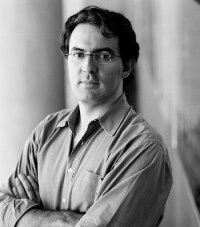 Hoy a partir de las 19:00 horas podrás disfrutar de la presentación de la traducción al inglés del último libro del autor colombiano Juan Gabriel Vásquez. El acto tendrá lugar en el Café Literario.
Hoy a partir de las 19:00 horas podrás disfrutar de la presentación de la traducción al inglés del último libro del autor colombiano Juan Gabriel Vásquez. El acto tendrá lugar en el Café Literario.
Se le considera uno de los mejores novelistas de su generación, y El ruido de las cosas al caer, que aborda el devenir de Colombia durante la época de Pablo Escobar, es hasta la fecha su mejor novela.
Tan pronto conoce a Ricardo Laverde, el joven Antonio Yammara comprende que en el pasado de su nuevo amigo hay un secreto, o quizá varios. Su atracción por la misteriosa vida de Laverde, nacida al hilo de sus encuentros en un billar, se transforma en verdadera obsesión el día en que éste es asesinado.
Convencido de que resolver el enigma de Laverde le señalará un camino en su encrucijada vital, Yammara emprende una investigación que se remonta a los primeros años setenta, cuando una generación de jóvenes idealistas fue testigo del nacimiento de un negocio que acabaría por llevar a Colombia —y al mundo— al borde del abismo.
Juan Gabriel Vásquez (Rosario, Colombia, 1973) estudió derecho en su ciudad natal y más tarde se doctoró en Literatura Latinoamericana en La Sorbona. Actualmente reside en Barcelona. Es autor de tres novelas “oficiales” —Los informantes, Historia secreta de Costaguana y El ruido de las cosas al caer—, aunque escribió otras cuando tenía 23 y 25 años de edad, que él prefiere eliminar. Sus novelas han sido traducidas en Inglaterra, Francia, Holanda, Italia y Polonia.
We are delighted to invite you to the book launch of the translation into English of the last novel written by Colombian writer Juan Gabriel Vásquez. The event will take place today at 7pm at Café Literario.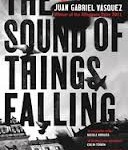
Juan Gabriel Vasquez is one of the leading novelists of his generation, and The Sound of Things Falling that tackles what became of Colombia in the time of Pablo Escobar is his best book to date.
No sooner does he get to know Ricardo Laverde than young Antonio Yammara realises that his new friend has a secret, or rather several secrets. Antonio’s fascination with the life of Laverde begins by casual acquaintance in a billiard hall and grows until the day Ricardo is murdered.
More out of love with life than ever, he starts asking questions until the questions become an obsession that leads him to Laverde’s daughter. His troubled investigation leads all the way back to the early 1960s, marijuana smuggling and a time before the cocaine trade trapped a whole generation of Colombians in a living nightmare of fear and random death.
Juan Gabriel Vásquez (Rosario, Colombia, 1973) studied law in his hometown and obtained a phd in Latin American Literature in the Sorbone University. At present he lives in Barcelona. He has published three “official” novels – The informers, The secret history of Costaguana and The Sound of Things Falling— however he wrote others at the age of 23 and 25 which he prefers to omit. His works have been translated in England, France, Netherlands, Italy and Poland.
El presidente Michael D. Higgins en el Instituto Cervantes de Dublín / President Michael D. Higgins in the Instituto Cervantes in Dublin
El presidente de Irlanda, Michael D. Higgins, inauguró oficialmente la primera edición del Festival ISLA de Literatura el pasado 2 de noviembre en el Instituto Cervantes de Dublín. y con ello contribuyó de manera decisiva a su éxito. El festival, por el que pasaron a lo largo del fin de semana cerca de mil asistentes, reunió a escritores de Argentina, Chile, Cuba, México, Irlanda y España en torno a una serie de lecturas, mesas redondas y proyecciones cinematográficas.
El presidente habló ante una sala abarrotada con cerca de 200 personas y les dio la bienvenida en español, irlandés, e inglés. Después de saludar a los asistentes, centró su alocución en los recuerdos de su reciente viaje diplomático por América Latina.
«He regresado recientemente de mi visita a Chile, Brasil y Argentina, una parte del mundo que tiene un lugar especial en mi corazón», dijo Higgins. «Durante este viaje, me llamó la atención una vez más la profundidad del compromiso con la cultura y la literatura irlandesa que existe en América Latina y cómo nuestras dos tradiciones se han influido y enriquecido mutuamente».
Higgins habló después sobre el papel que la escritora Kate O’Brien ha jugado en la literatura irlandesa y española, y la intensa conexión de la autora con España.
El amor del presidente por la poesía también se hizo evidente cuando aplaudió el énfasis que el Festival ISLA de Literatura hizo sobre este género en su programa. «Estoy impresionado por la profundidad y la fuerza de la poesía en este programa. Seamus Heaney, en su magnífica colección de ensayos «The Redress of Poetry», habla de cómo la poesía equilibra «la balanza de la realidad hacia un cierto equilibrio trascendente». El festival ISLA, con sus fuertes elementos interculturales, y los muchos poetas representados en él, como Maighread Medbh y Lorna Shaughnessy, parece tener esa inventiva deliciosa de la que Heaney habla en su obra».
El presidente finalizó leyendo el poema de Oliver St. John Gogarty «An Long» primero en lengua irlandesa y después en inglés.
Información basada en la nota de prensa de Megan Specia y Sergio Angulo.
Michael D. Higgins launched the first Irish, Spanish, and Latin America (ISLA) Literary Festival on the evening of November 2 in the Instituto Cervantes in Dublin. The festival, which brought together writers from Argentina, Chile, Cuba, Mexico, Ireland and Spain, was held over the weekend and featured a series of readings and round table discussions.
The President spoke to a crowd of approximately 200 participants and welcomed them in Spanish, Irish, and English. After greeting the crowd, he spoke to those gathered about a recent diplomatic trip to Latin America.
“I have recently returned from visiting Chile, Brazil, and Argentina, a part of the world which has a cherished place in my heart,” said Higgins. “During these visits, I was struck again by the depth of the engagement with Irish culture and writing that exists in Latin America and how our two traditions have influenced and enriched each other.”
Higgins went on to speak about the role than writer Kate O´Brien has played in Irish and Spanish literature, and the intense connection of the author to Spain.
The President´s love of poetry was also evident when he applauded ISLA´s emphasis on the genre. Said Higgins, “[I am] impressed by the depth and strength of poetic representation in the programme. Seamus Heaney, in his great collection on ´The Redress of Poetry´, speaks of how poetry balances ´the scales of reality towards some transcendent equilibrium´. The ISLA festival, with its strong intercultural elements, and the many poets represented like Maighread Medbh and Lorna Shaughnessy … would seem to have that self-delighting inventiveness of which Heaney speaks.”
He closed by reading Oliver St. John Gogarty´s poem “An Long” (The Ship) first in the Irish language and then in English.
Megan Specia & Sergio Angulo
Recital Literario | Literary Reading: “Poesía, por Diego Valverde Villena” (“Poetry, by Diego Valverde Villena”)
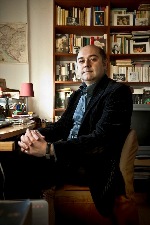 El Instituto Cervantes de Dublín y la National University of Ireland Maynooth tienen el placer de ofrecer al público irlandés este recorrido por la obra y la trayectoria del poeta hispano-peruano Diego Valverde, que realizará una lectura comentada de algunos de sus poemas y dialogará con la profesora del departamento de español, Catherine O’Leary, sobre sus influencias y carrera literaria.
El Instituto Cervantes de Dublín y la National University of Ireland Maynooth tienen el placer de ofrecer al público irlandés este recorrido por la obra y la trayectoria del poeta hispano-peruano Diego Valverde, que realizará una lectura comentada de algunos de sus poemas y dialogará con la profesora del departamento de español, Catherine O’Leary, sobre sus influencias y carrera literaria.
Diego Valverde Villena nació en San Isidro, Lima, Perú en 1967. Es poeta de nacionalidad peruana y española. Su vida siempre ha estado unida a la literatura. Entre 2002 y 2004 trabajó en la Secretaría de Estado de Cultura de España. Ha llevado a cabo estudios de especialización en lengua y literatura en las universidades de Salamanca, Edimburgo, Dublín y Wroclaw. Diego Valverde tiene una prolífica carrera como traductor de obras literarias desde el alemán, francés, inglés, italiano y portugués al castellano.
Instituto Cervantes Dublin and NUI Maynooth are delighted to present Spanish-Peruvian author Diego Valverde Villena, who will perform a commented reading of some of his poems and will discuss about his work, literary career and influcences with Ms Catherine O’Leary, lecturer of the Spanish Department.
Diego Valverde Villena, born on April 6, 1967, is a Spanish poet of Peruvian origin and Bolivian roots. In 1971, when he was four, his family left Peru for Spain. he also attended courses on language and literature in the University of Salamanca (Scandinavian languages), University of Edinburgh (Modernism), University College Dublin (Irish literature and culture) and the University of Wroclaw (Polish language and literature). From 2002 to 2004 he worked in the staff of the Secretary of State for Culture in Spain.
Hoy leemos con | Today we are reading with: Ita Daly, Rafael Gumucio, Maighréad Medbh, Lorenzo Silva.
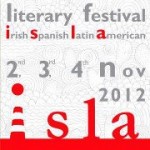 Para finalizar el Festival Literario ISLA, os ofrecemos unas lecturas en el Café Literario, el 4 de Noviembre a las 12.45.
Para finalizar el Festival Literario ISLA, os ofrecemos unas lecturas en el Café Literario, el 4 de Noviembre a las 12.45.
Última lectura del festival que clausura este festín literario con las voces de estos cuatro escritores que leerán una selección de su obra en su lengua original. Presenta: Megan Specia.
Ita Daly (Drumshanbo, Leitrim, Irlanda) ha publicado cinco novelas, una colección de cuentos y dos libros infantiles. Ha recibido el premio Hennessy Literary Award y el Irish Times Short Story Award. Su obra ha sido traducida al sueco, danés, japonés, italiano y alemán y sus relatos cortos han aparecido en revistas de Irlanda, Inglaterra y Estados Unidos. Uno de sus libros de relatos, The Lady With the Red Shoes, forma parte del plan de estudios de las escuelas de secundaria alemanas.
Rafael Gumucio (Santiago, Chile, 1970) es escritor y profesor de castellano y se licenció en Literatura por la Universidad de Chile. Ha trabajado como periodista en varios diarios. En 1995 publicó el libro de relatos Invierno en la Torre y Memorias Prematuras. Ha publicado también las novelasComedia Nupcial, Los Platos Rotos y Páginas Coloniales. Su última novela es La Deuda (2009). Actualmente es Director del Instituto de Estudios Humorísticos de la Universidad Diego Portales y co-conductor del programa Desde Zero en Radio Zero. Ha recibido el premio Anna Seghers, Alemania, 2002.
Máighréad Medbh (Condado de Limerick, Irlanda) ha publicado cinco libros de poesía y un audiolibro. Fue pionera de la performance poética en Irlanda en los años 90. Su colección más reciente es Twelve Beds for the Dreamer (2010). La obra de Máighréad ha sido publicada en una gran variedad de antologías y ha escrito versiones de poemas gallegos para dos antologías recientes editadas por Manuela Palacios (Universidad de Santiago de Compostela).
Lorenzo Silva (Madrid, España, 1966) ha escrito, entre otras, las novelas La flaqueza del bolcheviqueque ha sido llevada al cine por Manuel Martín Cuenca, y Carta blanca. Ha publicado también libros infantiles y juveniles, además de ensayos. Es especialmente conocido por la serie policíaca protagonizada por los investigadores Bevilacqua y Chamorro, iniciada conEl lejano país de los estanques (Premio Ojo Crítico 1998), y a la que siguió, entre otras, El alquimista impaciente (Premio Nadal 2000). Su último libro es Niños Feroces (2011). Su obra ha sido traducida a numerosos idiomas, como ruso, francés, alemán, italiano o griego.
To close the ISLA Literary Festival, we offer some readings at Café Literario, in November 4th at 12:45.
This literary festival will close with poetry readings by these four writers in their original language. Introduced by: Megan Specia.
(Drumshambo, Co. Leitrim) has published five novels, one collection of short stories and two books for children. She has won two Hennessy Literary Awards and an Irish Times Short Story Award. Her last novel, Unholy Ghosts (1997), was long listed for the International IMPAC Dublin Literary Award. Her work has been translated into Swedish, Danish, Japanese, Italian and German and her short stories have appeared in magazines in Ireland, England and America. Her short story collection The Lady With the Red Shoes (1980) is currently on the secondary school curriculum in Germany.
Rafael Gumucio (Santiago, Chile, 1970) has worked as a journalist for many Chilean and Spanish newspapers, as well as the New York Times. In 1995 he published the collection of short stories Invierno en la Torre and Memorias prematuras. He also published the novels Comedia Nupcial, Los Platos Rotos and Páginas Coloniales. His latest novel, La Deuda, was published in 2009. He now works as the director of the Institute for Humour Studies of the University Diego Portales and is co-conductor of Desde Zero at the radio station Zero. He received the Anna Seghers Award in Germany in 2002.
Máighréad Medbh (Co. Limerick) has five published poetry collections and an audio CD. She was a pioneer of performance poetry in Ireland in the nineteen-nineties. Her most recent collection, Twelve Beds for the Dreamer was published in 2010. Máighréad has been published in a wide range of anthologies, and has written versions of Galician poems for two recent anthologies edited by Manuela Palacios of Universidad de Santiago de Compostela.
Lorenzo Silva (Madrid, Spain, 1966) is author of novels such as La Flaqueza del Bolchevique which was adapted for cinema by Manuel Martín Cuenca, and Carta Blanca. He has also published books for children and young adults, as well as essays. He is especially known for the crime series starring detectives Bevilacqua and Chamorro, the series started with El lejano país de los estanques winner of the Ojo Crítico Award in 1998, and was followed by El Alquimista Impaciente winner of the Nadal Award in 2000, the later being adapted to cinema by Patricia Ferreira. His latest book Niños Feroces was published in 2011. His books have been translated into numerous languages such as Russian, French, German, Italian and Greek.
[Video] Rafael Gumucio en el Festival Isla de Literatura / Isla Literary Festival
Rafael Gumucio participó en la mesa redonda «Escritores sin escrúpulos: intimidad, violencia y humor en literatura» / “Writers without scruples: Intimacy, violence and humour in literature“. Entrevistado por Carmen Sanjulián. Edición de video: Cris Méndez.
Temas como la identidad y la memoria, la violencia o el humor fueron tratados por los invitados Ita Daly, Christopher Domínguez Michael, Rafael Gumucio y Catherine Dunne, con la moderación de Ciaran Cosgrove (Trinity College Dublin).
Rafael Gumucio (Santiago, Chile, 1970) ha trabajado como periodista en numerosos diarios nacionales chilenos, españoles y en el New York Times. En 1995 publicó el libro de relatos Invierno en la Torre y Memorias Prematuras. Ha publicado también las novelas Comedia Nupcial, Los Platos Rotos y Páginas Coloniales. Su última novela es La Deuda (2009).
Actualmente es Director del Instituto de Estudios Humorísticos de la Universidad Diego Portales y co-conductor de Desde Zero en Radio Zero.
Topics such as identity and memory, violence or humour were dealt with by guests Ita Daly, Christopher Domínguez Michael, Rafael Gumucio and Catherine Dunne, chaired by Ciaran Cosgrove (Trinity College Dublin).
Rafael Gumucio (Santiago, Chile, 1970) has worked as a journalist for many Chilean and Spanish newspapers, as well as the New York Times. In 1995 he published the collection of short stories Invierno en la Torre and Memorias prematuras. He also published the novels Comedia Nupcial, Los Platos Rotos and Páginas Coloniales. His latest novel, La Deuda, was published in 2009.
He now works as the director of the Institute for Humour Studies of the University Diego Portales and is co-conductor of Desde Zero at the radio station Zero. He received the Anna Seghers Award in Germany in 2002.
http://dublin.cervantes.es/FichasCult…
[Video] Christopher Domínguez Michael en el Festival Isla de Literatura / Isla Literary Festival
Christopher Domínguez Michael participó en la mesa redonda “Escritores sin escrúpulos: intimidad, violencia y humor en literatura” / Writers without scruples: Intimacy, violence and humour in literature. Entrevistado por Sergio Angulo. Edición de video: Cris Méndez.
Temas como la identidad y la memoria, la violencia o el humor fueron tratados por los invitados Ita Daly, Christopher Domínguez Michael, Rafael Gumucio y Catherine Dunne, con la moderación de Ciaran Cosgrove (Trinity College Dublin).
Christopher Domínguez Michael (Ciudad de México, México, 1962), historiador y ensayista, es uno de los más conocidos críticos literarios hispanoamericanos. Es autor de numerosas publicaciones, siendo su última publicación Profetas del pasado: Quince voces sobre la historiografía de México (2011).
Es miembro del Sistema Nacional de Creadores de Arte desde 1993. Su Diccionario crítico de la literatura mexicana, 1955–2005 ha sido traducido y actualizado al inglés en 2012.
Topics such as identity and memory, violence or humour were dealt with by guests Ita Daly, Christopher Domínguez Michael, Rafael Gumucio and Catherine Dunne, chaired by Ciaran Cosgrove (Trinity College Dublin).
Christopher Domínguez Michael (Mexico City, Mexico, 1962) is a historian and essayist, and also one of the most famous Hispanic-American literary critics. He is the author of several works, being his latest novel Profetas Del Pasado. Quince Voces Sobre La Historiografía De México was published in 2011.
He is a member of the Sistema Nacional de Creadores de Arte (National System for Art Creators) since 1993. His work Diccionario Crítico de la Literatura Mexicana, 1955-2005 (Critical Dictionary of Mexican Literature, 1955–2010) has been translated into English and was updated in 2012.
[Video] María Negroni en el Festival Isla de Literatura / Isla Literary Festival
María Negroni no pudo participar en la mesa prevista el día 2 de noviembre por los problemas ocasionados por el huracán Sandy en el aeropuerto de Nueva York, por ello, participó en una de las mesas redondas del día 3: “Conflictos: ficción, humor y sociedad” junto a Lorenzo Silva, Bernardo Toro y Niamh O’Connor. María Negroni es entrevistada por Alfonso Fernández Cid. Edición de video: Cris Méndez.
Memoria histórica, conflictos nacionales o internacionales, crimen y cotidianidad serán temas presentes en esta mesa gracias a la creación literaria de los invitados Lorenzo Silva, Bernardo Toro, María Negroni y Niamh O’Connor. Modera: Kate Quinn (NUI Galway)
María Negroni (Rosario, Argentina, 1951) es poeta, ensayista y novelista. Como poeta, ha publicado, entre otros libros: Islandia, El viaje de la noche, Arte y Fuga, La Boca del Infierno y Cantar la nada. También ha publicado varios libros de ensayos y dos novelas. Ha traducido, entre otros, a Emily Dickinson, Louise Labé, Valentine Penrose, Georges Bataille, H.D., Charles Simic y Bernard Noël, y la antología de mujeres poetas norteamericanas La pasión del exilio (2007).
Su libro Islandia recibió el premio del PEN American Center en Nueva York al mejor libro de poesía en traducción del año (2001) y Galería Fantástica recibió el Premio Internacional de Ensayo de Siglo XXI (México).
Su obra ha sido traducida al inglés, francés, sueco e italiano.
Historical memory, national or international conflicts and crime and daily life will be topics at this table thanks to literary works by guests Lorenzo Silva, Bernardo Toro, María Negroni and Niamh O’Connor. Chaired by Kate Quinn (NUI Galway).
María Negroni (Rosario, Argentina, 1951) is a poet, essayist and novelist. She has published numerous poetry books: Islandia, El viaje de la noche, Arte y Fuga, La Boca del infierno and Cantar la nada, to mention just a few. She is also author of several essays and two novels.
She has translated several poets: Emily Dickinson, Louise Labé, Valentine Penrose, Georges Bataille, H.D., Charles Simic and Bernard Noël, as well as the anthology of 20th century North American women poets La Pasión del Exilio (2007).
Her book Islandia received the 2001 PEN American Center Award for best book of poetry in translation. She was awarded the 21st Century International Essay Prize (Mexico) for her book Galería Fantástica.
Her work has been translated into English, French, Swedish and Italian.
